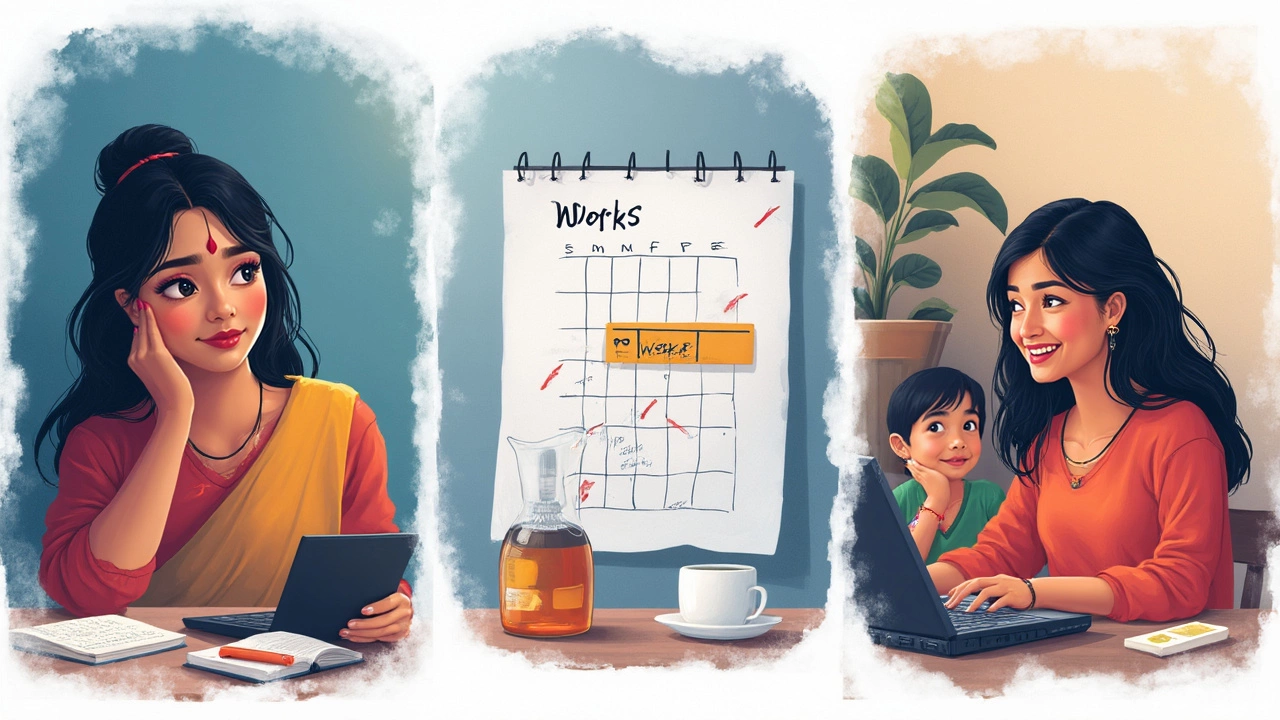Spending an hour a day on something sounds do–able, right? That’s part of why so many folks ask if it’s enough to learn coding. Spoiler: one hour a day can totally work, but it’s not magic. If you’re hoping to go from zero to pro in a few weeks on that schedule, get ready for a reality check. But if you’re in it for steady progress, that hour adds up—way more than you’d think.
The cool part? Coding is a skill where small, regular practice beats giant cram sessions every time. There’s actually research showing that spaced learning—doing a bit every day—helps you remember stuff better and makes ideas stick. Seriously, trying to code five hours once a week won't get you as far as one solid, focused hour each day. Your brain just handles it better in small chunks.
But here’s where people get frustrated: that one hour won’t always feel productive, especially at the start. At first, you’ll spend a lot of time Googling, reading error messages, and doubting your choices in life. That’s totally normal. The first few weeks can feel painfully slow, but your brain is building new pathways, even if it isn’t obvious yet.
If you only have an hour a day, getting organized matters. Jumping in without a plan usually means wasting time figuring out where you left off. It’s much smarter to have a set path, a project, or a structured curriculum. Break down your goals so you always know what to focus on when you sit down. This is especially true for self-taught learners—it’s so easy to get lost staring at a blank screen or watching endless tutorials without actually writing real code.
- The Reality of a 1-Hour-a-Day Commitment
- How Progress Really Happens
- Common Pitfalls and How to Dodge Them
- Tips to Maximize Your Coding Hour
The Reality of a 1-Hour-a-Day Commitment
You’re probably wondering if 1 hour a day is really enough to learn coding. Here’s what’s real: one hour daily is actually more consistent than what most people do in online coding classes. Most beginners sign up super excited, then disappear after a week because they tried to do too much too fast. But sticking to a regular, steady pace? That helps more in the long run—think of it like daily workouts versus a single grueling session every weekend.
If you add up 1 hour a day, that’s 7 hours a week or about 30 a month. Most intro-level courses (like Python basics or HTML/CSS bootcamps) are built around 40–60 hours of hands-on practice. So with a one-hour-a-day plan, you could finish an entire beginner course in about two months without burning out.
| Time Spent Coding | Weekly Total | Monthly Total |
|---|---|---|
| 1 hour/day | 7 hours | 30 hours |
| 30 mins/day | 3.5 hours | 15 hours |
| 2 hours every Sunday | 2 hours | 8 hours |
Consistency is the secret weapon here. That hour each day gives your brain time to learn a bit, take a break, and revisit it the next day. It’s the same strategy language learners use, and it works because you’re always reinforcing what you learned.
But there’s something important to keep in mind. Not every coding session will be smooth. Some days will feel super productive: you’ll finish a tutorial, fix a bug, or finally get a tricky concept. Other days, you might wrestle with one error the entire hour. Don’t get discouraged—that’s part of the ride. One hour a day doesn’t guarantee a straight path, but it does mean you keep moving forward, little by little.
So, is 1 hour a day enough? For beginners, it’s honestly a great starting point. Over months, daily practice can turn total newbies into people who can tackle real projects—if you stay on track and don’t skip days.
How Progress Really Happens
When people picture learning to code, they might imagine fast results, but the reality is usually different. Progress in learn coding is way more like training for a marathon than sprinting a 100-meter dash. Skills build slowly, especially when you’re putting in a steady hour each day.
Here’s how it usually goes: the first couple of weeks are all about laying the groundwork. New words, basic syntax, making sense of errors—your brain is getting a major workout. At first, you’ll probably forget stuff and run into the same problems over and over. This is 100% part of the process. The key is showing up for that one hour daily, even when everything feels confusing.
The big secret is something called the "compounding effect." Just like investing a little money each day grows into a nice stash, daily coding practice builds up your skills. By week five or six, you’ll notice patterns—problems look familiar, your typing gets faster, and new concepts make sense quicker.
If you want some numbers, check this out:
| Weeks of Practice | Hours (1 hour/day) | Typical Skill Milestone |
|---|---|---|
| 2 | 14 | Basic syntax, running first simple programs |
| 6 | 42 | Handling errors, building small functions |
| 12 | 84 | Making small projects, understanding code structure |
Another thing: breakthroughs often happen during moments when you’re stuck. That’s because your brain keeps working in the background, connecting dots even after you log off. If you push through rough patches and keep showing up, you’ll surprise yourself with what you can actually do.
Remember, success isn’t about how fancy your code looks in the first month. It’s about building habits, organizing your work, and actually finishing little projects. Bottom line: steady effort turns those daily hours into real skills, and anyone can get there if they just keep going.

Common Pitfalls and How to Dodge Them
So you’ve decided on 1 hour a day for learning coding. That’s solid. But honestly, just sitting down isn’t enough. Tons of beginners fall into the same traps, and these can slow you down a lot. Let’s call out a few big ones and see how to sidestep them.
- “Tutorial Hell” – This is when you keep watching tutorial after tutorial without ever building anything on your own. Sure, you feel like you’re learning, but until you code something yourself—even if it’s super basic—it won’t really click. Try this: For every hour of tutorial time, spend at least half an hour messing around with code by yourself.
- Skipping the basics – It’s tempting to jump straight into “real” projects or flashy tech, but if you don’t understand things like loops, variables, or functions, you’ll hit a wall fast. Building a strong base in fundamental concepts makes everything else way easier.
- Overwhelm from too many resources – The internet is packed with learning platforms, courses, and YouTube channels about learn coding. It’s easy to bounce between them and lose track of what you actually need. Pick one course or path and stick with it for a while. Switching constantly won’t help you go deeper.
- Not asking for help – Tons of newbies try to figure everything out alone and beat their heads against the wall over a single bug for hours. Don’t do this! Use forums like Stack Overflow, Reddit, or even local coding groups to get quick advice. Most experienced coders got there by asking lots of questions early on.
Researchers at the University of Helsinki studied beginner programmers and found that most struggle with motivation after the first few weeks. They suggested, “Consistent, visible progress is key to sticking with it, even when the initial excitement wears off.”
"Don’t be afraid to slow down when something confuses you. Real understanding happens when you wrestle with the hard stuff, not when you rush past it." — Harvard CS50 Teaching Team
One last thing—track your progress. Write down what you’re working on and ‘aha’ moments. This simple habit helps fight discouragement and shows you just how far you’ve come.
Tips to Maximize Your Coding Hour
So you’ve got an hour a day to work on coding. Here’s how to make every single minute count, especially if you’re learning through coding classes or on your own.
- Plan Before You Start: Don’t waste your hour figuring out what to do. Spend a couple of minutes at the end of each session jotting down where you left off or what you want to tackle next. Use a simple note app or a sticky note beside your laptop.
- Stick to One Topic at a Time: Don’t try to learn JavaScript functions, CSS grids, and databases all at once. Pick one concept and focus just on that. That’s how skills actually stick.
- Don’t Just Read—Code!: Watching tutorials doesn’t replace hands-on practice. Research from Stack Overflow's 2023 survey showed that devs who spend more time actually writing code pick up skills faster than those who mostly watch or read about it.
- Review Old Stuff: The best way to remember what you learn is to go back and fix old code. Reworking your past mistakes helps new ideas lock in.
- Use Timers: Get specific. Try 45 minutes of pure coding and 15 minutes of review and goal setting. Batching tasks this way keeps you focused instead of scattered.
- Automate Your Setup: Have your coding environment, resources, and notes ready before your hour starts. Use bookmarks for helpful references, or set up your IDE (like VS Code) so you aren’t wasting time searching for files.
- Celebrate Small Wins: Learning coding can feel endless. When you finally squash that bug or build something tiny that actually works, note it somewhere. It keeps you motivated when progress feels slow.
Want some proof that this works? Take a look at how steady short bursts add up over study periods:
| Daily Coding Time | Weeks to Reach 100 Hours |
|---|---|
| 1 hour/day | ~14 weeks |
| 2 hours/day | ~7 weeks |
| 5 hours/week (cramming) | ~20 weeks |
Notice something? The consistent 1 hour a day slot gets you to those all-important 100 hours of practice way faster than irregular marathon sessions. So stick with that daily groove—it pays off.
